Report: Personal and Professional Development in Health & Social Care
VerifiedAdded on 2020/06/05
|13
|4019
|28
Report
AI Summary
This report delves into the multifaceted aspects of personal and professional development within the health and social care sector. It begins by comparing personal values and principles with the core principles of support, emphasizing the influence of personal culture and experience on the role of a health and social care professional. The report further explores the impact of new developments and changes in personal values on the work of health and social care. It assesses skills, abilities, and learning styles, culminating in a holistic developmental plan with short, medium, and long-term goals. The analysis extends to monitoring self-performance, evaluating the effectiveness of the developmental plan, and examining the nature of professional relationships. The report also evaluates personal effectiveness in promoting and supporting individual rights, resolving issues in professional relationships, and improving personal contributions to effective teamwork within the health and care services. It also highlights the impact of limitations on one's work role and the importance of minimizing barriers to teamwork. The report provides a comprehensive overview of personal and professional development in health and social care settings, focusing on the key elements that influence the effectiveness of services provided to patients.
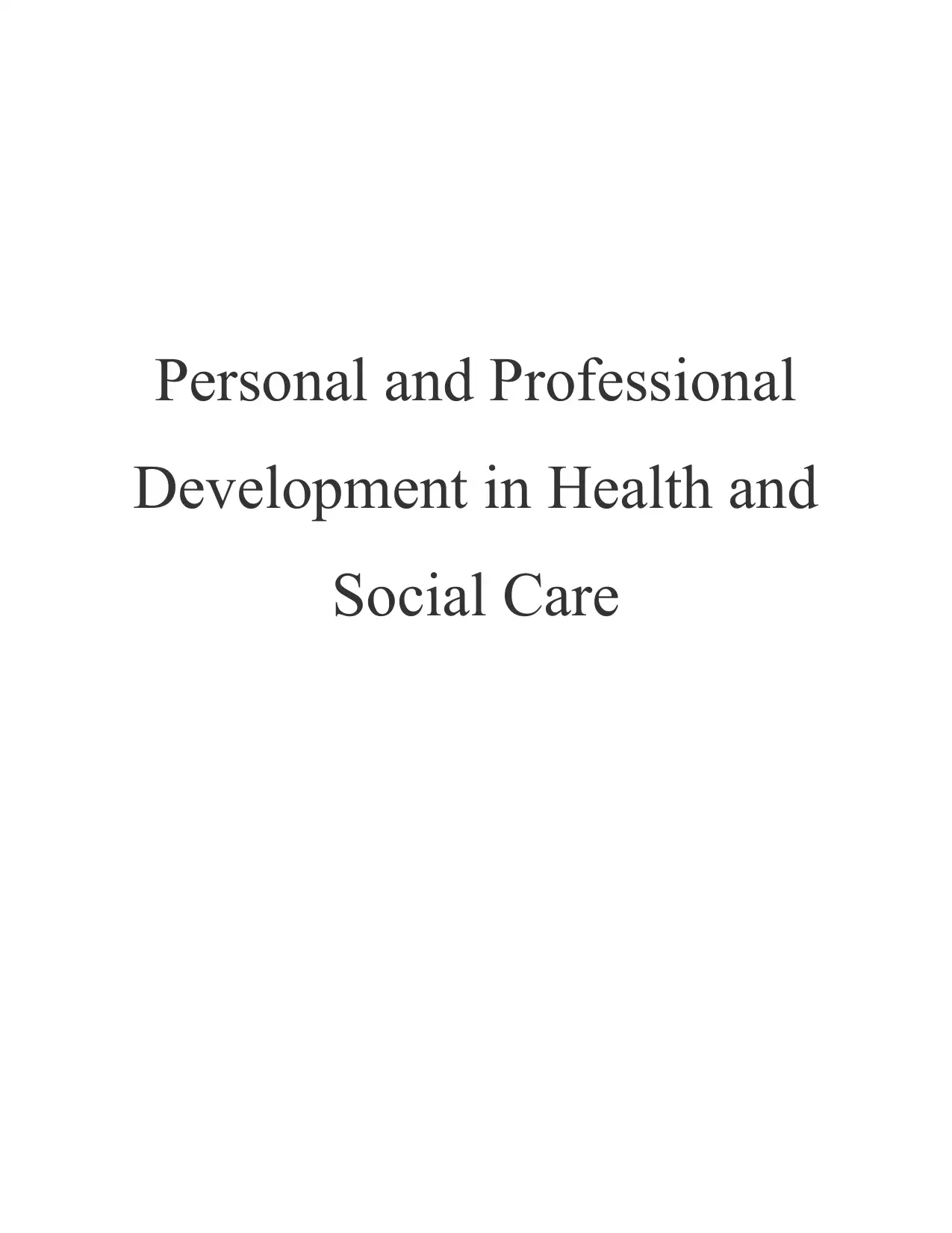
Personal and Professional
Development in Health and
Social Care
Development in Health and
Social Care
Paraphrase This Document
Need a fresh take? Get an instant paraphrase of this document with our AI Paraphraser
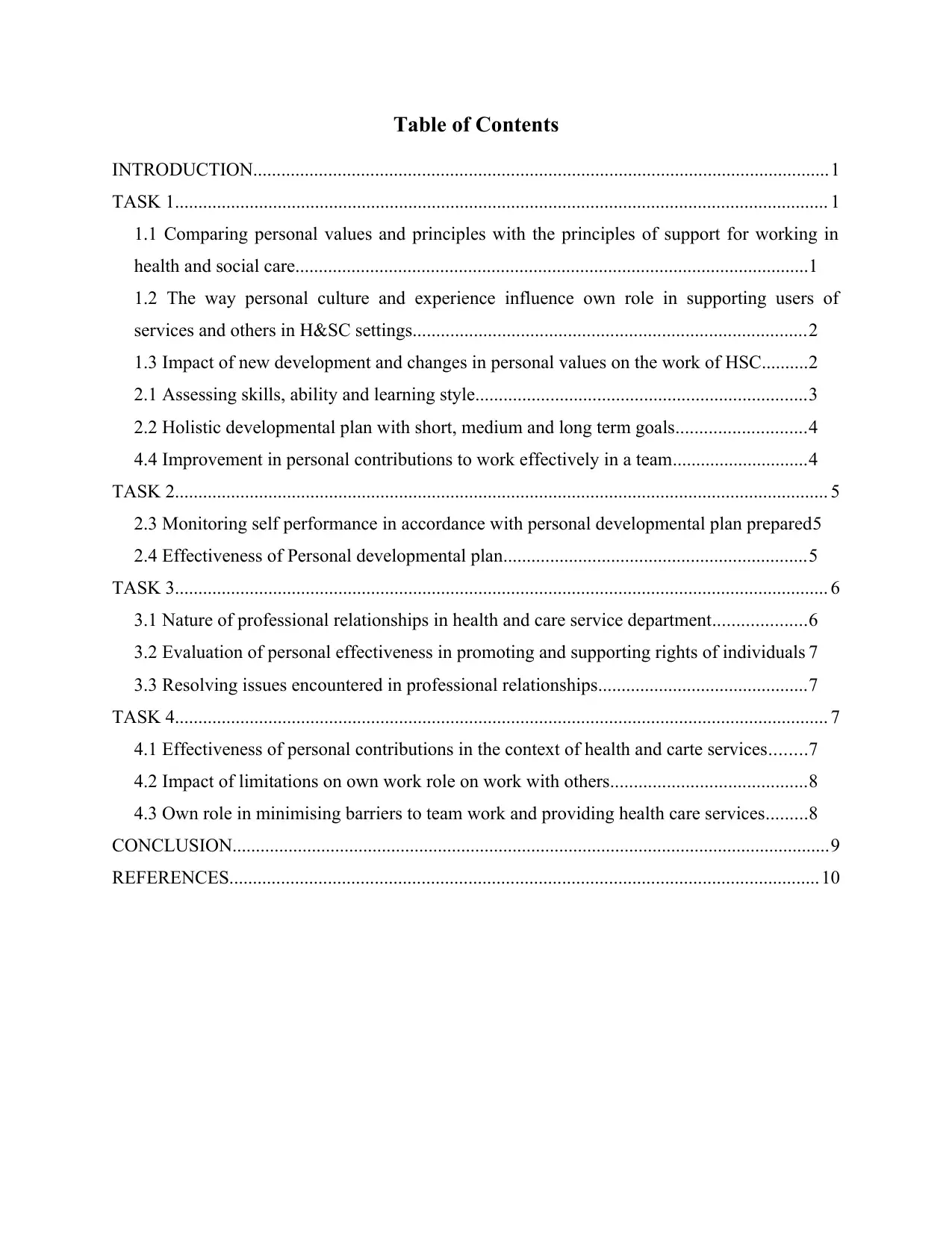
Table of Contents
INTRODUCTION...........................................................................................................................1
TASK 1............................................................................................................................................ 1
1.1 Comparing personal values and principles with the principles of support for working in
health and social care..............................................................................................................1
1.2 The way personal culture and experience influence own role in supporting users of
services and others in H&SC settings....................................................................................2
1.3 Impact of new development and changes in personal values on the work of HSC..........2
2.1 Assessing skills, ability and learning style.......................................................................3
2.2 Holistic developmental plan with short, medium and long term goals............................4
4.4 Improvement in personal contributions to work effectively in a team.............................4
TASK 2............................................................................................................................................ 5
2.3 Monitoring self performance in accordance with personal developmental plan prepared5
2.4 Effectiveness of Personal developmental plan.................................................................5
TASK 3............................................................................................................................................ 6
3.1 Nature of professional relationships in health and care service department....................6
3.2 Evaluation of personal effectiveness in promoting and supporting rights of individuals 7
3.3 Resolving issues encountered in professional relationships.............................................7
TASK 4............................................................................................................................................ 7
4.1 Effectiveness of personal contributions in the context of health and carte services........7
4.2 Impact of limitations on own work role on work with others..........................................8
4.3 Own role in minimising barriers to team work and providing health care services.........8
CONCLUSION................................................................................................................................9
REFERENCES.............................................................................................................................. 10
INTRODUCTION...........................................................................................................................1
TASK 1............................................................................................................................................ 1
1.1 Comparing personal values and principles with the principles of support for working in
health and social care..............................................................................................................1
1.2 The way personal culture and experience influence own role in supporting users of
services and others in H&SC settings....................................................................................2
1.3 Impact of new development and changes in personal values on the work of HSC..........2
2.1 Assessing skills, ability and learning style.......................................................................3
2.2 Holistic developmental plan with short, medium and long term goals............................4
4.4 Improvement in personal contributions to work effectively in a team.............................4
TASK 2............................................................................................................................................ 5
2.3 Monitoring self performance in accordance with personal developmental plan prepared5
2.4 Effectiveness of Personal developmental plan.................................................................5
TASK 3............................................................................................................................................ 6
3.1 Nature of professional relationships in health and care service department....................6
3.2 Evaluation of personal effectiveness in promoting and supporting rights of individuals 7
3.3 Resolving issues encountered in professional relationships.............................................7
TASK 4............................................................................................................................................ 7
4.1 Effectiveness of personal contributions in the context of health and carte services........7
4.2 Impact of limitations on own work role on work with others..........................................8
4.3 Own role in minimising barriers to team work and providing health care services.........8
CONCLUSION................................................................................................................................9
REFERENCES.............................................................................................................................. 10
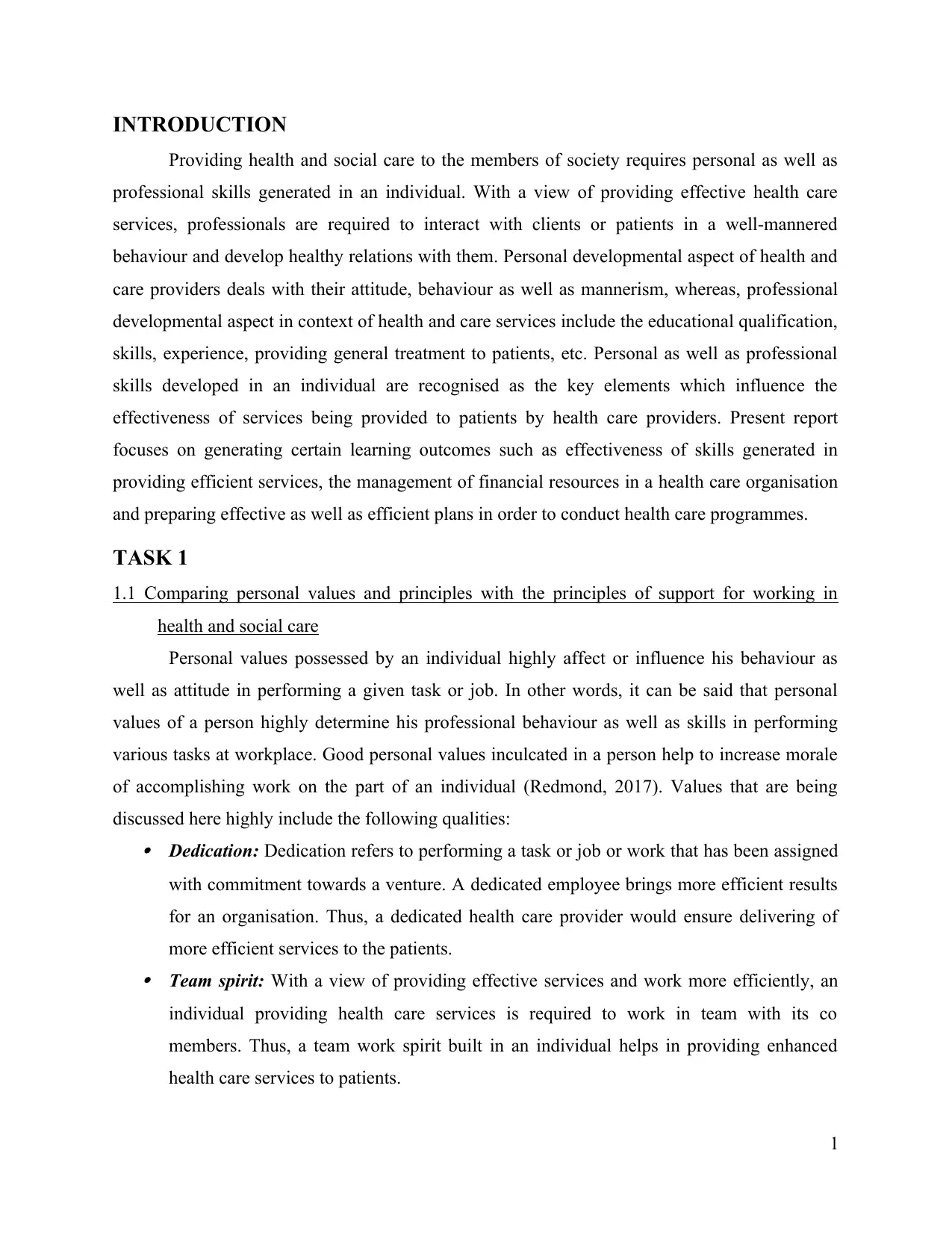
INTRODUCTION
Providing health and social care to the members of society requires personal as well as
professional skills generated in an individual. With a view of providing effective health care
services, professionals are required to interact with clients or patients in a well-mannered
behaviour and develop healthy relations with them. Personal developmental aspect of health and
care providers deals with their attitude, behaviour as well as mannerism, whereas, professional
developmental aspect in context of health and care services include the educational qualification,
skills, experience, providing general treatment to patients, etc. Personal as well as professional
skills developed in an individual are recognised as the key elements which influence the
effectiveness of services being provided to patients by health care providers. Present report
focuses on generating certain learning outcomes such as effectiveness of skills generated in
providing efficient services, the management of financial resources in a health care organisation
and preparing effective as well as efficient plans in order to conduct health care programmes.
TASK 1
1.1 Comparing personal values and principles with the principles of support for working in
health and social care
Personal values possessed by an individual highly affect or influence his behaviour as
well as attitude in performing a given task or job. In other words, it can be said that personal
values of a person highly determine his professional behaviour as well as skills in performing
various tasks at workplace. Good personal values inculcated in a person help to increase morale
of accomplishing work on the part of an individual (Redmond, 2017). Values that are being
discussed here highly include the following qualities:
Dedication: Dedication refers to performing a task or job or work that has been assigned
with commitment towards a venture. A dedicated employee brings more efficient results
for an organisation. Thus, a dedicated health care provider would ensure delivering of
more efficient services to the patients.
Team spirit: With a view of providing effective services and work more efficiently, an
individual providing health care services is required to work in team with its co
members. Thus, a team work spirit built in an individual helps in providing enhanced
health care services to patients.
1
Providing health and social care to the members of society requires personal as well as
professional skills generated in an individual. With a view of providing effective health care
services, professionals are required to interact with clients or patients in a well-mannered
behaviour and develop healthy relations with them. Personal developmental aspect of health and
care providers deals with their attitude, behaviour as well as mannerism, whereas, professional
developmental aspect in context of health and care services include the educational qualification,
skills, experience, providing general treatment to patients, etc. Personal as well as professional
skills developed in an individual are recognised as the key elements which influence the
effectiveness of services being provided to patients by health care providers. Present report
focuses on generating certain learning outcomes such as effectiveness of skills generated in
providing efficient services, the management of financial resources in a health care organisation
and preparing effective as well as efficient plans in order to conduct health care programmes.
TASK 1
1.1 Comparing personal values and principles with the principles of support for working in
health and social care
Personal values possessed by an individual highly affect or influence his behaviour as
well as attitude in performing a given task or job. In other words, it can be said that personal
values of a person highly determine his professional behaviour as well as skills in performing
various tasks at workplace. Good personal values inculcated in a person help to increase morale
of accomplishing work on the part of an individual (Redmond, 2017). Values that are being
discussed here highly include the following qualities:
Dedication: Dedication refers to performing a task or job or work that has been assigned
with commitment towards a venture. A dedicated employee brings more efficient results
for an organisation. Thus, a dedicated health care provider would ensure delivering of
more efficient services to the patients.
Team spirit: With a view of providing effective services and work more efficiently, an
individual providing health care services is required to work in team with its co
members. Thus, a team work spirit built in an individual helps in providing enhanced
health care services to patients.
1
⊘ This is a preview!⊘
Do you want full access?
Subscribe today to unlock all pages.

Trusted by 1+ million students worldwide
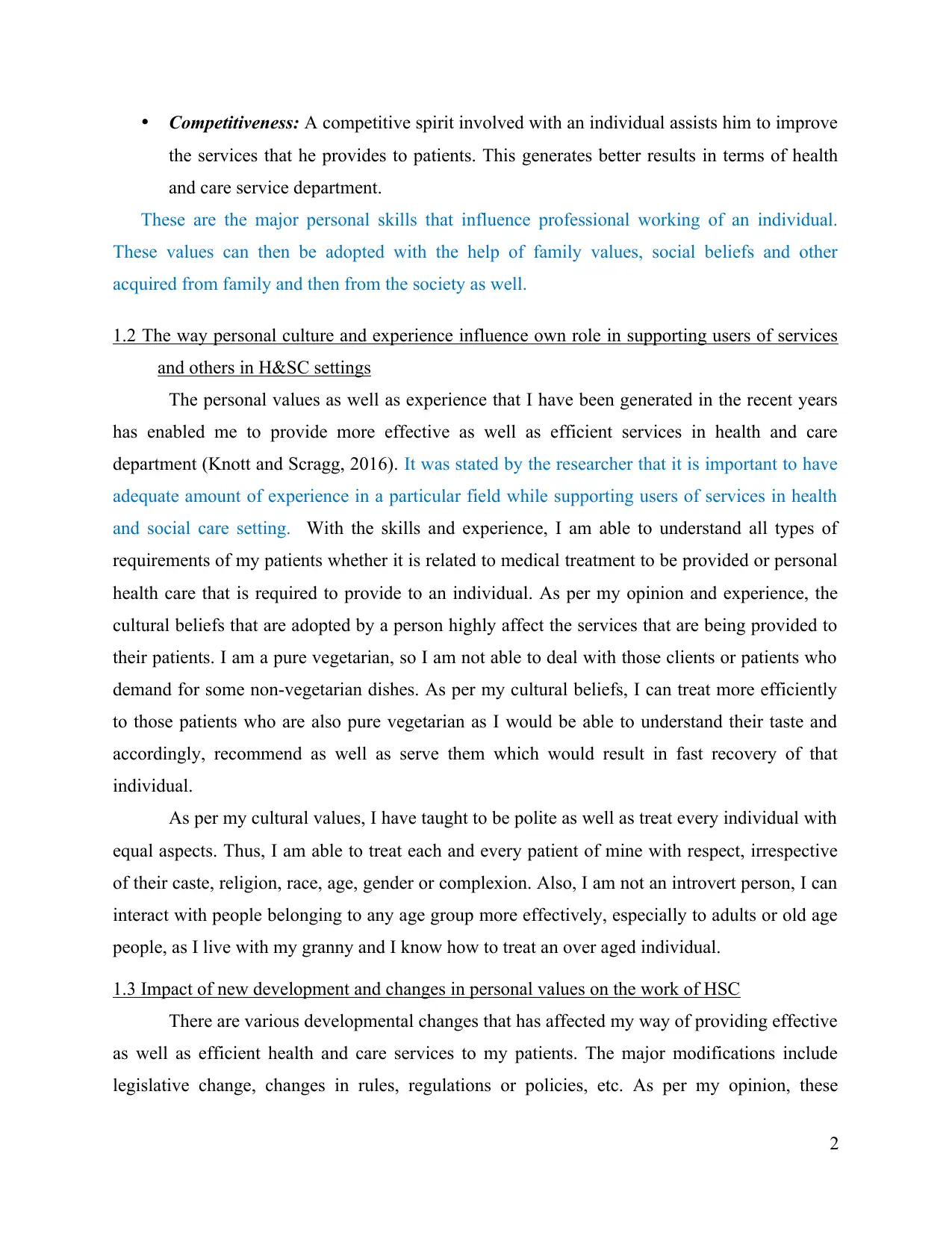
Competitiveness: A competitive spirit involved with an individual assists him to improve
the services that he provides to patients. This generates better results in terms of health
and care service department.
These are the major personal skills that influence professional working of an individual.
These values can then be adopted with the help of family values, social beliefs and other
acquired from family and then from the society as well.
1.2 The way personal culture and experience influence own role in supporting users of services
and others in H&SC settings
The personal values as well as experience that I have been generated in the recent years
has enabled me to provide more effective as well as efficient services in health and care
department (Knott and Scragg, 2016). It was stated by the researcher that it is important to have
adequate amount of experience in a particular field while supporting users of services in health
and social care setting. With the skills and experience, I am able to understand all types of
requirements of my patients whether it is related to medical treatment to be provided or personal
health care that is required to provide to an individual. As per my opinion and experience, the
cultural beliefs that are adopted by a person highly affect the services that are being provided to
their patients. I am a pure vegetarian, so I am not able to deal with those clients or patients who
demand for some non-vegetarian dishes. As per my cultural beliefs, I can treat more efficiently
to those patients who are also pure vegetarian as I would be able to understand their taste and
accordingly, recommend as well as serve them which would result in fast recovery of that
individual.
As per my cultural values, I have taught to be polite as well as treat every individual with
equal aspects. Thus, I am able to treat each and every patient of mine with respect, irrespective
of their caste, religion, race, age, gender or complexion. Also, I am not an introvert person, I can
interact with people belonging to any age group more effectively, especially to adults or old age
people, as I live with my granny and I know how to treat an over aged individual.
1.3 Impact of new development and changes in personal values on the work of HSC
There are various developmental changes that has affected my way of providing effective
as well as efficient health and care services to my patients. The major modifications include
legislative change, changes in rules, regulations or policies, etc. As per my opinion, these
2
the services that he provides to patients. This generates better results in terms of health
and care service department.
These are the major personal skills that influence professional working of an individual.
These values can then be adopted with the help of family values, social beliefs and other
acquired from family and then from the society as well.
1.2 The way personal culture and experience influence own role in supporting users of services
and others in H&SC settings
The personal values as well as experience that I have been generated in the recent years
has enabled me to provide more effective as well as efficient services in health and care
department (Knott and Scragg, 2016). It was stated by the researcher that it is important to have
adequate amount of experience in a particular field while supporting users of services in health
and social care setting. With the skills and experience, I am able to understand all types of
requirements of my patients whether it is related to medical treatment to be provided or personal
health care that is required to provide to an individual. As per my opinion and experience, the
cultural beliefs that are adopted by a person highly affect the services that are being provided to
their patients. I am a pure vegetarian, so I am not able to deal with those clients or patients who
demand for some non-vegetarian dishes. As per my cultural beliefs, I can treat more efficiently
to those patients who are also pure vegetarian as I would be able to understand their taste and
accordingly, recommend as well as serve them which would result in fast recovery of that
individual.
As per my cultural values, I have taught to be polite as well as treat every individual with
equal aspects. Thus, I am able to treat each and every patient of mine with respect, irrespective
of their caste, religion, race, age, gender or complexion. Also, I am not an introvert person, I can
interact with people belonging to any age group more effectively, especially to adults or old age
people, as I live with my granny and I know how to treat an over aged individual.
1.3 Impact of new development and changes in personal values on the work of HSC
There are various developmental changes that has affected my way of providing effective
as well as efficient health and care services to my patients. The major modifications include
legislative change, changes in rules, regulations or policies, etc. As per my opinion, these
2
Paraphrase This Document
Need a fresh take? Get an instant paraphrase of this document with our AI Paraphraser
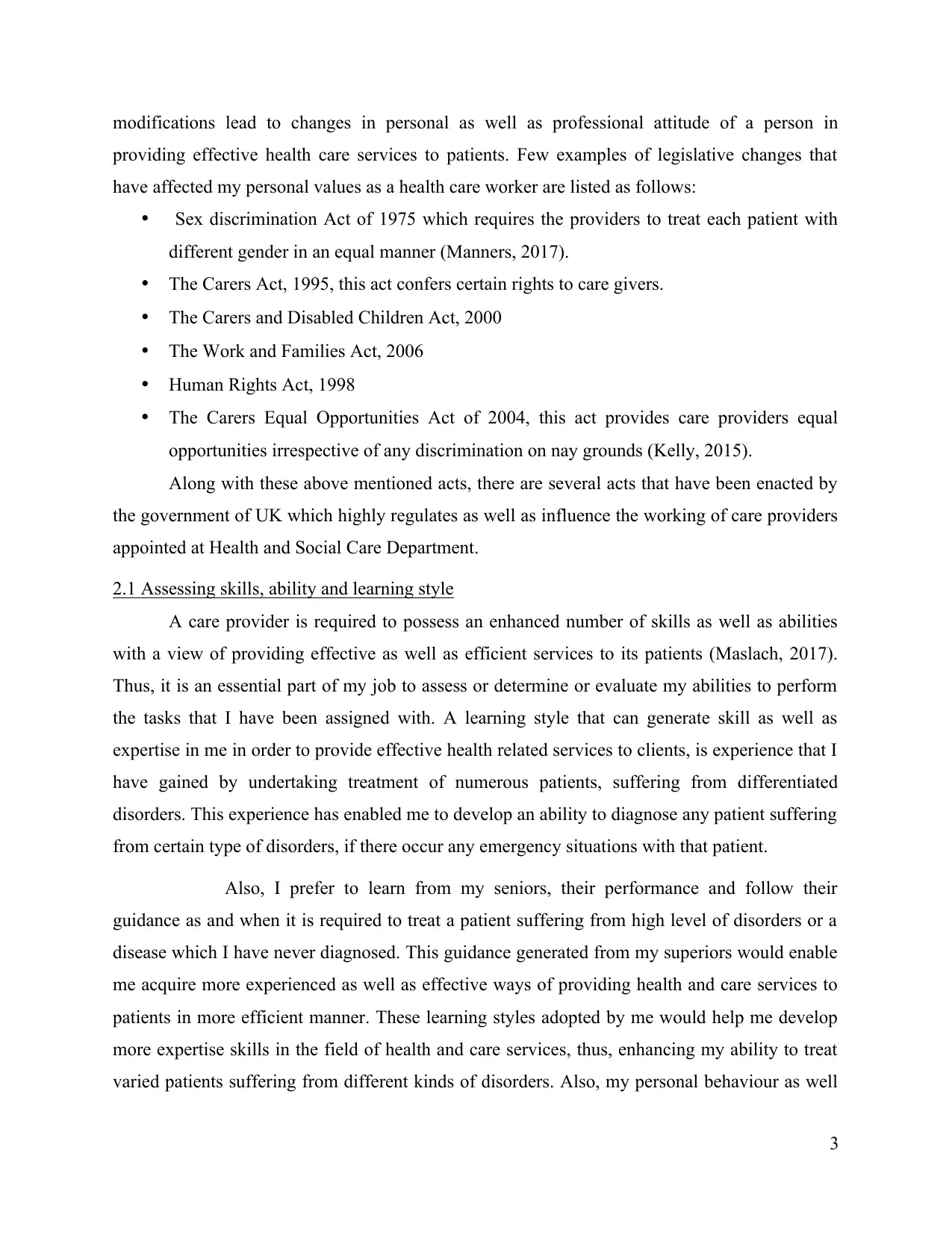
modifications lead to changes in personal as well as professional attitude of a person in
providing effective health care services to patients. Few examples of legislative changes that
have affected my personal values as a health care worker are listed as follows:
Sex discrimination Act of 1975 which requires the providers to treat each patient with
different gender in an equal manner (Manners, 2017).
The Carers Act, 1995, this act confers certain rights to care givers.
The Carers and Disabled Children Act, 2000
The Work and Families Act, 2006
Human Rights Act, 1998
The Carers Equal Opportunities Act of 2004, this act provides care providers equal
opportunities irrespective of any discrimination on nay grounds (Kelly, 2015).
Along with these above mentioned acts, there are several acts that have been enacted by
the government of UK which highly regulates as well as influence the working of care providers
appointed at Health and Social Care Department.
2.1 Assessing skills, ability and learning style
A care provider is required to possess an enhanced number of skills as well as abilities
with a view of providing effective as well as efficient services to its patients (Maslach, 2017).
Thus, it is an essential part of my job to assess or determine or evaluate my abilities to perform
the tasks that I have been assigned with. A learning style that can generate skill as well as
expertise in me in order to provide effective health related services to clients, is experience that I
have gained by undertaking treatment of numerous patients, suffering from differentiated
disorders. This experience has enabled me to develop an ability to diagnose any patient suffering
from certain type of disorders, if there occur any emergency situations with that patient.
Also, I prefer to learn from my seniors, their performance and follow their
guidance as and when it is required to treat a patient suffering from high level of disorders or a
disease which I have never diagnosed. This guidance generated from my superiors would enable
me acquire more experienced as well as effective ways of providing health and care services to
patients in more efficient manner. These learning styles adopted by me would help me develop
more expertise skills in the field of health and care services, thus, enhancing my ability to treat
varied patients suffering from different kinds of disorders. Also, my personal behaviour as well
3
providing effective health care services to patients. Few examples of legislative changes that
have affected my personal values as a health care worker are listed as follows:
Sex discrimination Act of 1975 which requires the providers to treat each patient with
different gender in an equal manner (Manners, 2017).
The Carers Act, 1995, this act confers certain rights to care givers.
The Carers and Disabled Children Act, 2000
The Work and Families Act, 2006
Human Rights Act, 1998
The Carers Equal Opportunities Act of 2004, this act provides care providers equal
opportunities irrespective of any discrimination on nay grounds (Kelly, 2015).
Along with these above mentioned acts, there are several acts that have been enacted by
the government of UK which highly regulates as well as influence the working of care providers
appointed at Health and Social Care Department.
2.1 Assessing skills, ability and learning style
A care provider is required to possess an enhanced number of skills as well as abilities
with a view of providing effective as well as efficient services to its patients (Maslach, 2017).
Thus, it is an essential part of my job to assess or determine or evaluate my abilities to perform
the tasks that I have been assigned with. A learning style that can generate skill as well as
expertise in me in order to provide effective health related services to clients, is experience that I
have gained by undertaking treatment of numerous patients, suffering from differentiated
disorders. This experience has enabled me to develop an ability to diagnose any patient suffering
from certain type of disorders, if there occur any emergency situations with that patient.
Also, I prefer to learn from my seniors, their performance and follow their
guidance as and when it is required to treat a patient suffering from high level of disorders or a
disease which I have never diagnosed. This guidance generated from my superiors would enable
me acquire more experienced as well as effective ways of providing health and care services to
patients in more efficient manner. These learning styles adopted by me would help me develop
more expertise skills in the field of health and care services, thus, enhancing my ability to treat
varied patients suffering from different kinds of disorders. Also, my personal behaviour as well
3
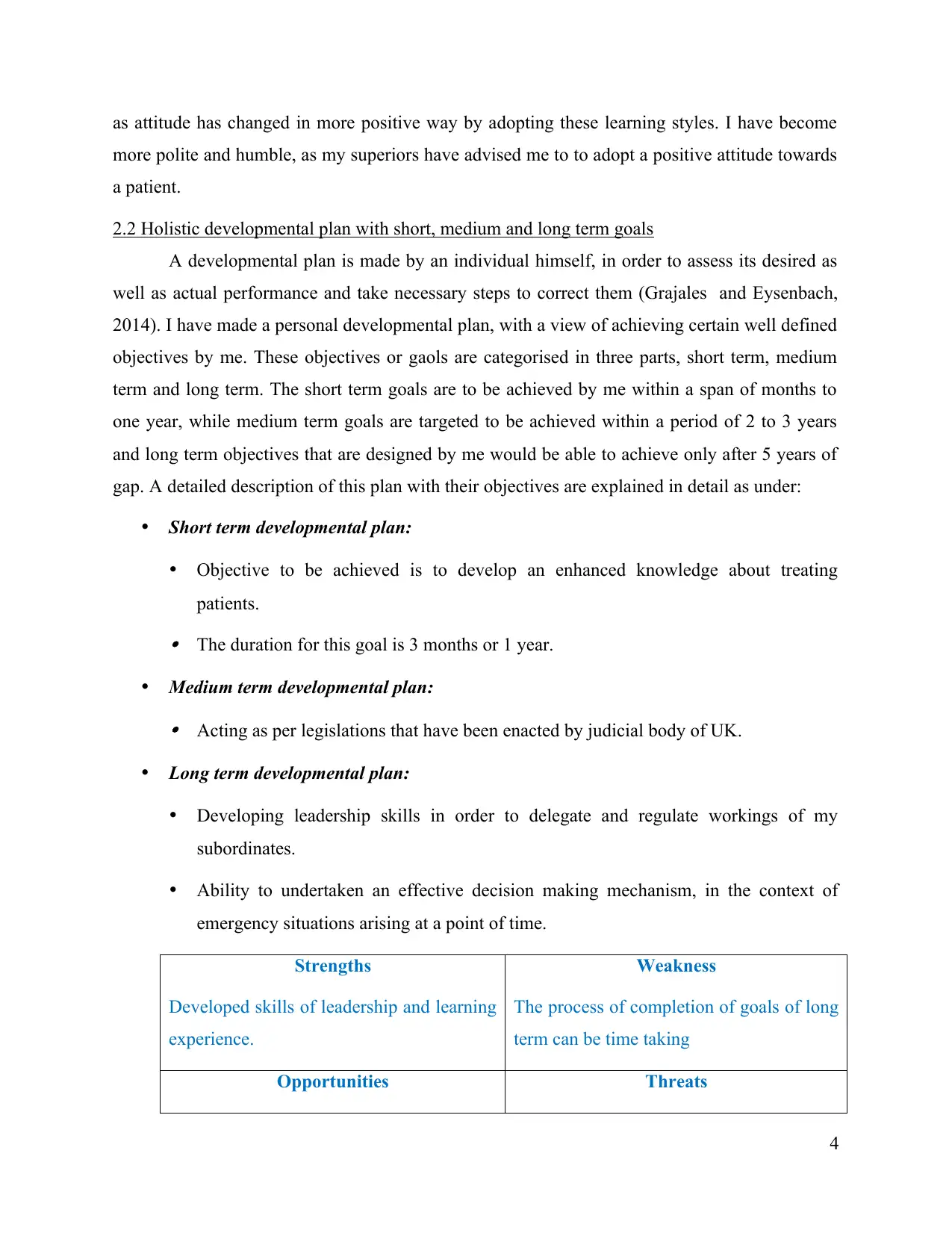
as attitude has changed in more positive way by adopting these learning styles. I have become
more polite and humble, as my superiors have advised me to to adopt a positive attitude towards
a patient.
2.2 Holistic developmental plan with short, medium and long term goals
A developmental plan is made by an individual himself, in order to assess its desired as
well as actual performance and take necessary steps to correct them (Grajales and Eysenbach,
2014). I have made a personal developmental plan, with a view of achieving certain well defined
objectives by me. These objectives or gaols are categorised in three parts, short term, medium
term and long term. The short term goals are to be achieved by me within a span of months to
one year, while medium term goals are targeted to be achieved within a period of 2 to 3 years
and long term objectives that are designed by me would be able to achieve only after 5 years of
gap. A detailed description of this plan with their objectives are explained in detail as under:
Short term developmental plan:
Objective to be achieved is to develop an enhanced knowledge about treating
patients.
The duration for this goal is 3 months or 1 year.
Medium term developmental plan:
Acting as per legislations that have been enacted by judicial body of UK.
Long term developmental plan:
Developing leadership skills in order to delegate and regulate workings of my
subordinates.
Ability to undertaken an effective decision making mechanism, in the context of
emergency situations arising at a point of time.
Strengths
Developed skills of leadership and learning
experience.
Weakness
The process of completion of goals of long
term can be time taking
Opportunities Threats
4
more polite and humble, as my superiors have advised me to to adopt a positive attitude towards
a patient.
2.2 Holistic developmental plan with short, medium and long term goals
A developmental plan is made by an individual himself, in order to assess its desired as
well as actual performance and take necessary steps to correct them (Grajales and Eysenbach,
2014). I have made a personal developmental plan, with a view of achieving certain well defined
objectives by me. These objectives or gaols are categorised in three parts, short term, medium
term and long term. The short term goals are to be achieved by me within a span of months to
one year, while medium term goals are targeted to be achieved within a period of 2 to 3 years
and long term objectives that are designed by me would be able to achieve only after 5 years of
gap. A detailed description of this plan with their objectives are explained in detail as under:
Short term developmental plan:
Objective to be achieved is to develop an enhanced knowledge about treating
patients.
The duration for this goal is 3 months or 1 year.
Medium term developmental plan:
Acting as per legislations that have been enacted by judicial body of UK.
Long term developmental plan:
Developing leadership skills in order to delegate and regulate workings of my
subordinates.
Ability to undertaken an effective decision making mechanism, in the context of
emergency situations arising at a point of time.
Strengths
Developed skills of leadership and learning
experience.
Weakness
The process of completion of goals of long
term can be time taking
Opportunities Threats
4
⊘ This is a preview!⊘
Do you want full access?
Subscribe today to unlock all pages.

Trusted by 1+ million students worldwide
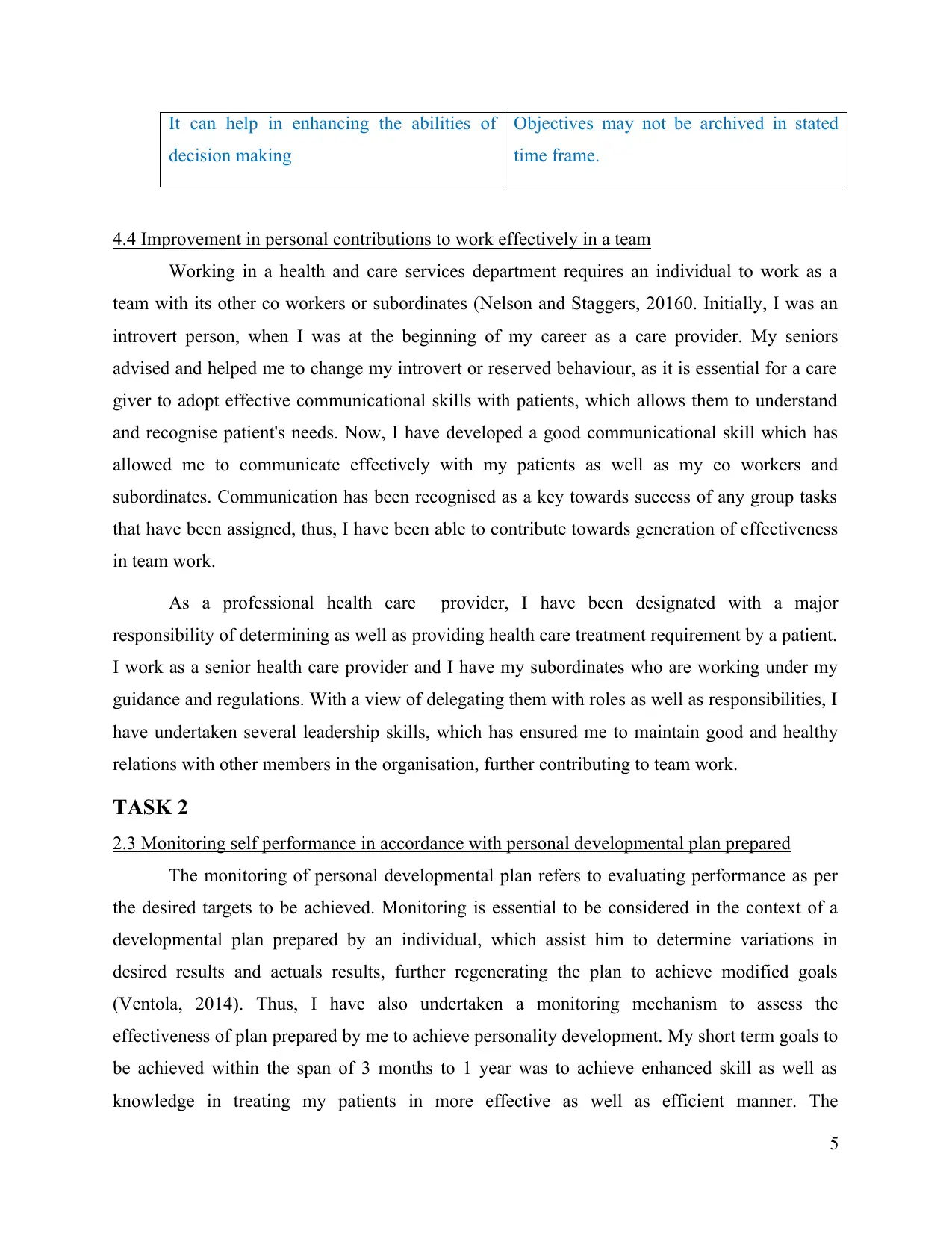
It can help in enhancing the abilities of
decision making
Objectives may not be archived in stated
time frame.
4.4 Improvement in personal contributions to work effectively in a team
Working in a health and care services department requires an individual to work as a
team with its other co workers or subordinates (Nelson and Staggers, 20160. Initially, I was an
introvert person, when I was at the beginning of my career as a care provider. My seniors
advised and helped me to change my introvert or reserved behaviour, as it is essential for a care
giver to adopt effective communicational skills with patients, which allows them to understand
and recognise patient's needs. Now, I have developed a good communicational skill which has
allowed me to communicate effectively with my patients as well as my co workers and
subordinates. Communication has been recognised as a key towards success of any group tasks
that have been assigned, thus, I have been able to contribute towards generation of effectiveness
in team work.
As a professional health care provider, I have been designated with a major
responsibility of determining as well as providing health care treatment requirement by a patient.
I work as a senior health care provider and I have my subordinates who are working under my
guidance and regulations. With a view of delegating them with roles as well as responsibilities, I
have undertaken several leadership skills, which has ensured me to maintain good and healthy
relations with other members in the organisation, further contributing to team work.
TASK 2
2.3 Monitoring self performance in accordance with personal developmental plan prepared
The monitoring of personal developmental plan refers to evaluating performance as per
the desired targets to be achieved. Monitoring is essential to be considered in the context of a
developmental plan prepared by an individual, which assist him to determine variations in
desired results and actuals results, further regenerating the plan to achieve modified goals
(Ventola, 2014). Thus, I have also undertaken a monitoring mechanism to assess the
effectiveness of plan prepared by me to achieve personality development. My short term goals to
be achieved within the span of 3 months to 1 year was to achieve enhanced skill as well as
knowledge in treating my patients in more effective as well as efficient manner. The
5
decision making
Objectives may not be archived in stated
time frame.
4.4 Improvement in personal contributions to work effectively in a team
Working in a health and care services department requires an individual to work as a
team with its other co workers or subordinates (Nelson and Staggers, 20160. Initially, I was an
introvert person, when I was at the beginning of my career as a care provider. My seniors
advised and helped me to change my introvert or reserved behaviour, as it is essential for a care
giver to adopt effective communicational skills with patients, which allows them to understand
and recognise patient's needs. Now, I have developed a good communicational skill which has
allowed me to communicate effectively with my patients as well as my co workers and
subordinates. Communication has been recognised as a key towards success of any group tasks
that have been assigned, thus, I have been able to contribute towards generation of effectiveness
in team work.
As a professional health care provider, I have been designated with a major
responsibility of determining as well as providing health care treatment requirement by a patient.
I work as a senior health care provider and I have my subordinates who are working under my
guidance and regulations. With a view of delegating them with roles as well as responsibilities, I
have undertaken several leadership skills, which has ensured me to maintain good and healthy
relations with other members in the organisation, further contributing to team work.
TASK 2
2.3 Monitoring self performance in accordance with personal developmental plan prepared
The monitoring of personal developmental plan refers to evaluating performance as per
the desired targets to be achieved. Monitoring is essential to be considered in the context of a
developmental plan prepared by an individual, which assist him to determine variations in
desired results and actuals results, further regenerating the plan to achieve modified goals
(Ventola, 2014). Thus, I have also undertaken a monitoring mechanism to assess the
effectiveness of plan prepared by me to achieve personality development. My short term goals to
be achieved within the span of 3 months to 1 year was to achieve enhanced skill as well as
knowledge in treating my patients in more effective as well as efficient manner. The
5
Paraphrase This Document
Need a fresh take? Get an instant paraphrase of this document with our AI Paraphraser
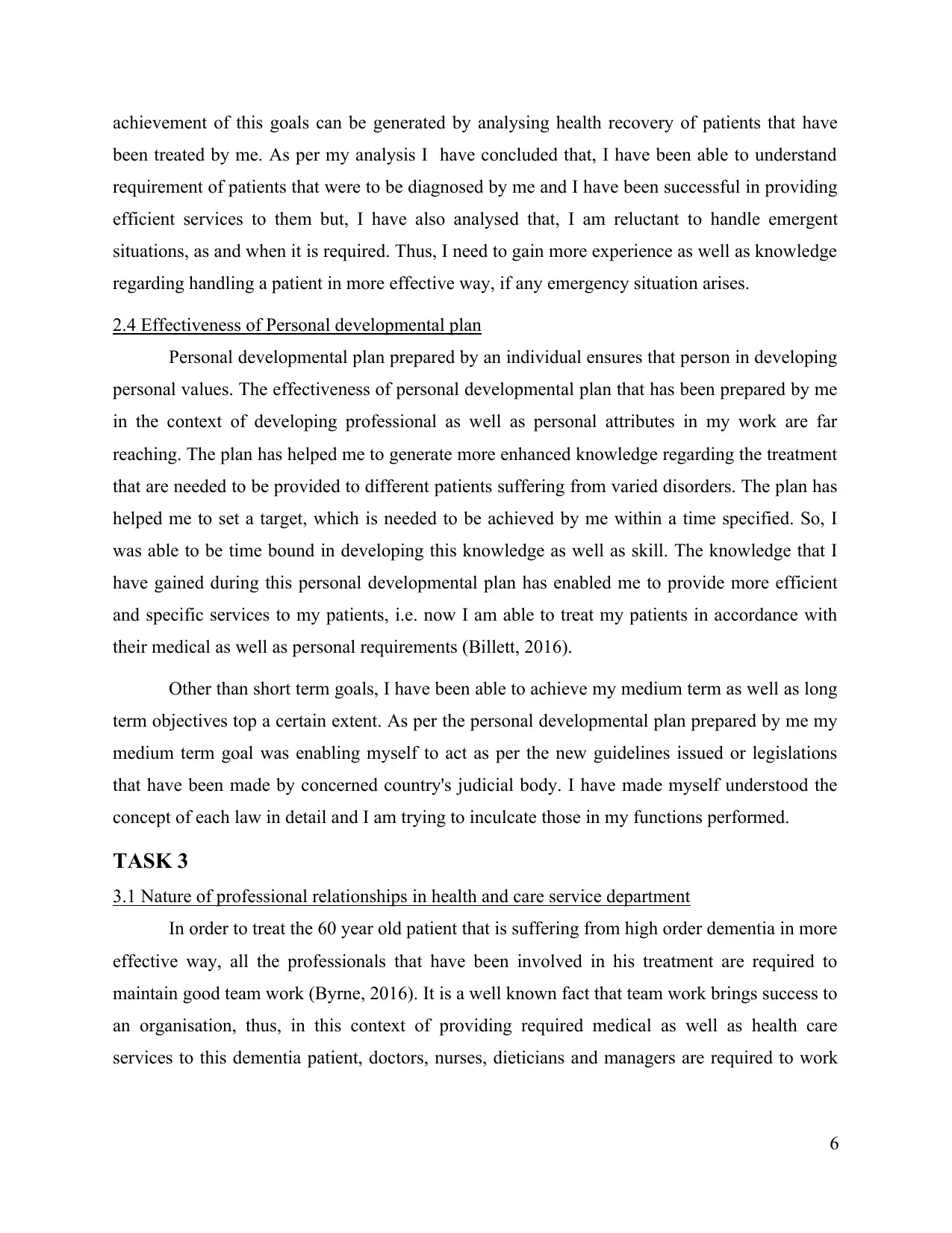
achievement of this goals can be generated by analysing health recovery of patients that have
been treated by me. As per my analysis I have concluded that, I have been able to understand
requirement of patients that were to be diagnosed by me and I have been successful in providing
efficient services to them but, I have also analysed that, I am reluctant to handle emergent
situations, as and when it is required. Thus, I need to gain more experience as well as knowledge
regarding handling a patient in more effective way, if any emergency situation arises.
2.4 Effectiveness of Personal developmental plan
Personal developmental plan prepared by an individual ensures that person in developing
personal values. The effectiveness of personal developmental plan that has been prepared by me
in the context of developing professional as well as personal attributes in my work are far
reaching. The plan has helped me to generate more enhanced knowledge regarding the treatment
that are needed to be provided to different patients suffering from varied disorders. The plan has
helped me to set a target, which is needed to be achieved by me within a time specified. So, I
was able to be time bound in developing this knowledge as well as skill. The knowledge that I
have gained during this personal developmental plan has enabled me to provide more efficient
and specific services to my patients, i.e. now I am able to treat my patients in accordance with
their medical as well as personal requirements (Billett, 2016).
Other than short term goals, I have been able to achieve my medium term as well as long
term objectives top a certain extent. As per the personal developmental plan prepared by me my
medium term goal was enabling myself to act as per the new guidelines issued or legislations
that have been made by concerned country's judicial body. I have made myself understood the
concept of each law in detail and I am trying to inculcate those in my functions performed.
TASK 3
3.1 Nature of professional relationships in health and care service department
In order to treat the 60 year old patient that is suffering from high order dementia in more
effective way, all the professionals that have been involved in his treatment are required to
maintain good team work (Byrne, 2016). It is a well known fact that team work brings success to
an organisation, thus, in this context of providing required medical as well as health care
services to this dementia patient, doctors, nurses, dieticians and managers are required to work
6
been treated by me. As per my analysis I have concluded that, I have been able to understand
requirement of patients that were to be diagnosed by me and I have been successful in providing
efficient services to them but, I have also analysed that, I am reluctant to handle emergent
situations, as and when it is required. Thus, I need to gain more experience as well as knowledge
regarding handling a patient in more effective way, if any emergency situation arises.
2.4 Effectiveness of Personal developmental plan
Personal developmental plan prepared by an individual ensures that person in developing
personal values. The effectiveness of personal developmental plan that has been prepared by me
in the context of developing professional as well as personal attributes in my work are far
reaching. The plan has helped me to generate more enhanced knowledge regarding the treatment
that are needed to be provided to different patients suffering from varied disorders. The plan has
helped me to set a target, which is needed to be achieved by me within a time specified. So, I
was able to be time bound in developing this knowledge as well as skill. The knowledge that I
have gained during this personal developmental plan has enabled me to provide more efficient
and specific services to my patients, i.e. now I am able to treat my patients in accordance with
their medical as well as personal requirements (Billett, 2016).
Other than short term goals, I have been able to achieve my medium term as well as long
term objectives top a certain extent. As per the personal developmental plan prepared by me my
medium term goal was enabling myself to act as per the new guidelines issued or legislations
that have been made by concerned country's judicial body. I have made myself understood the
concept of each law in detail and I am trying to inculcate those in my functions performed.
TASK 3
3.1 Nature of professional relationships in health and care service department
In order to treat the 60 year old patient that is suffering from high order dementia in more
effective way, all the professionals that have been involved in his treatment are required to
maintain good team work (Byrne, 2016). It is a well known fact that team work brings success to
an organisation, thus, in this context of providing required medical as well as health care
services to this dementia patient, doctors, nurses, dieticians and managers are required to work
6
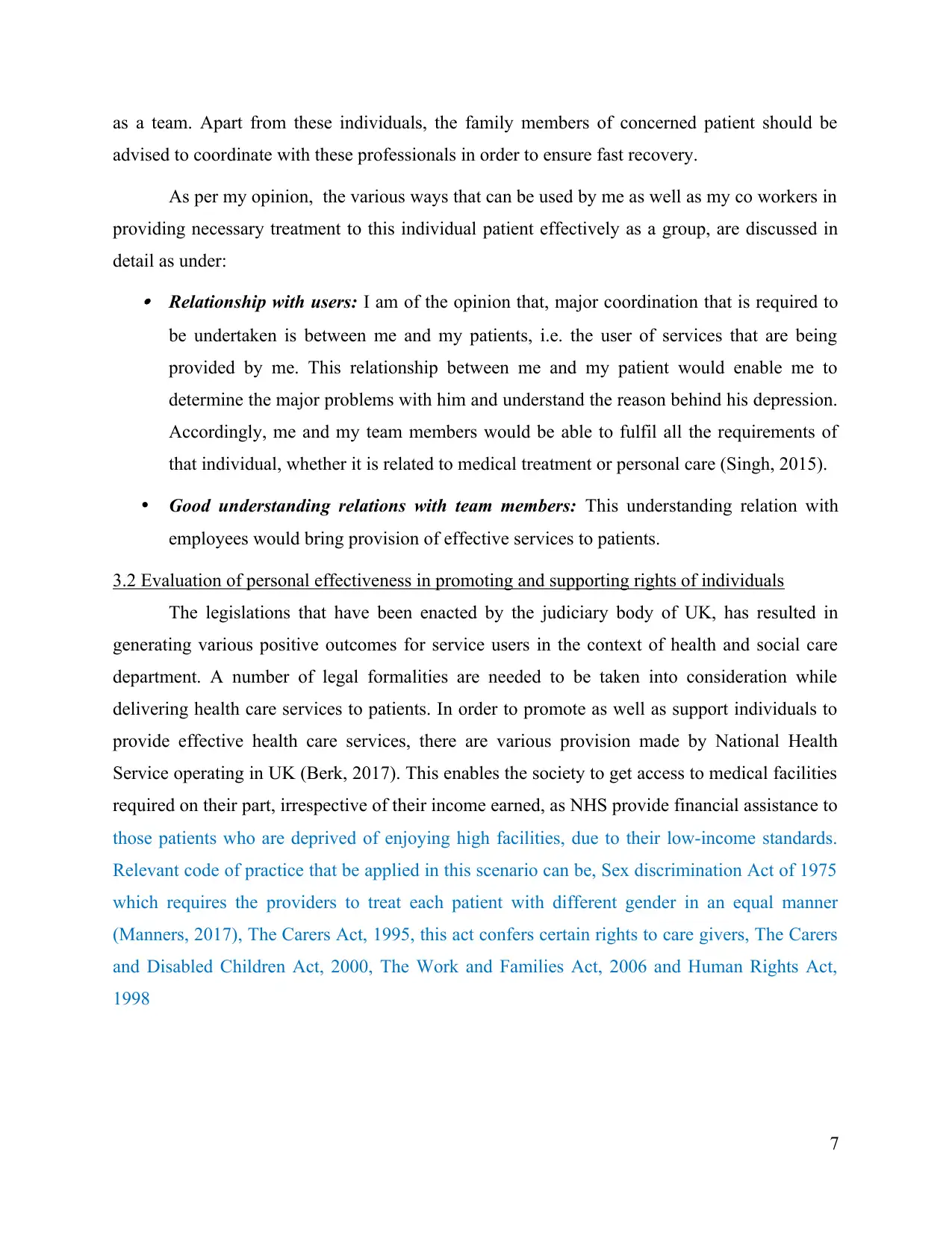
as a team. Apart from these individuals, the family members of concerned patient should be
advised to coordinate with these professionals in order to ensure fast recovery.
As per my opinion, the various ways that can be used by me as well as my co workers in
providing necessary treatment to this individual patient effectively as a group, are discussed in
detail as under: Relationship with users: I am of the opinion that, major coordination that is required to
be undertaken is between me and my patients, i.e. the user of services that are being
provided by me. This relationship between me and my patient would enable me to
determine the major problems with him and understand the reason behind his depression.
Accordingly, me and my team members would be able to fulfil all the requirements of
that individual, whether it is related to medical treatment or personal care (Singh, 2015).
Good understanding relations with team members: This understanding relation with
employees would bring provision of effective services to patients.
3.2 Evaluation of personal effectiveness in promoting and supporting rights of individuals
The legislations that have been enacted by the judiciary body of UK, has resulted in
generating various positive outcomes for service users in the context of health and social care
department. A number of legal formalities are needed to be taken into consideration while
delivering health care services to patients. In order to promote as well as support individuals to
provide effective health care services, there are various provision made by National Health
Service operating in UK (Berk, 2017). This enables the society to get access to medical facilities
required on their part, irrespective of their income earned, as NHS provide financial assistance to
those patients who are deprived of enjoying high facilities, due to their low-income standards.
Relevant code of practice that be applied in this scenario can be, Sex discrimination Act of 1975
which requires the providers to treat each patient with different gender in an equal manner
(Manners, 2017), The Carers Act, 1995, this act confers certain rights to care givers, The Carers
and Disabled Children Act, 2000, The Work and Families Act, 2006 and Human Rights Act,
1998
7
advised to coordinate with these professionals in order to ensure fast recovery.
As per my opinion, the various ways that can be used by me as well as my co workers in
providing necessary treatment to this individual patient effectively as a group, are discussed in
detail as under: Relationship with users: I am of the opinion that, major coordination that is required to
be undertaken is between me and my patients, i.e. the user of services that are being
provided by me. This relationship between me and my patient would enable me to
determine the major problems with him and understand the reason behind his depression.
Accordingly, me and my team members would be able to fulfil all the requirements of
that individual, whether it is related to medical treatment or personal care (Singh, 2015).
Good understanding relations with team members: This understanding relation with
employees would bring provision of effective services to patients.
3.2 Evaluation of personal effectiveness in promoting and supporting rights of individuals
The legislations that have been enacted by the judiciary body of UK, has resulted in
generating various positive outcomes for service users in the context of health and social care
department. A number of legal formalities are needed to be taken into consideration while
delivering health care services to patients. In order to promote as well as support individuals to
provide effective health care services, there are various provision made by National Health
Service operating in UK (Berk, 2017). This enables the society to get access to medical facilities
required on their part, irrespective of their income earned, as NHS provide financial assistance to
those patients who are deprived of enjoying high facilities, due to their low-income standards.
Relevant code of practice that be applied in this scenario can be, Sex discrimination Act of 1975
which requires the providers to treat each patient with different gender in an equal manner
(Manners, 2017), The Carers Act, 1995, this act confers certain rights to care givers, The Carers
and Disabled Children Act, 2000, The Work and Families Act, 2006 and Human Rights Act,
1998
7
⊘ This is a preview!⊘
Do you want full access?
Subscribe today to unlock all pages.

Trusted by 1+ million students worldwide
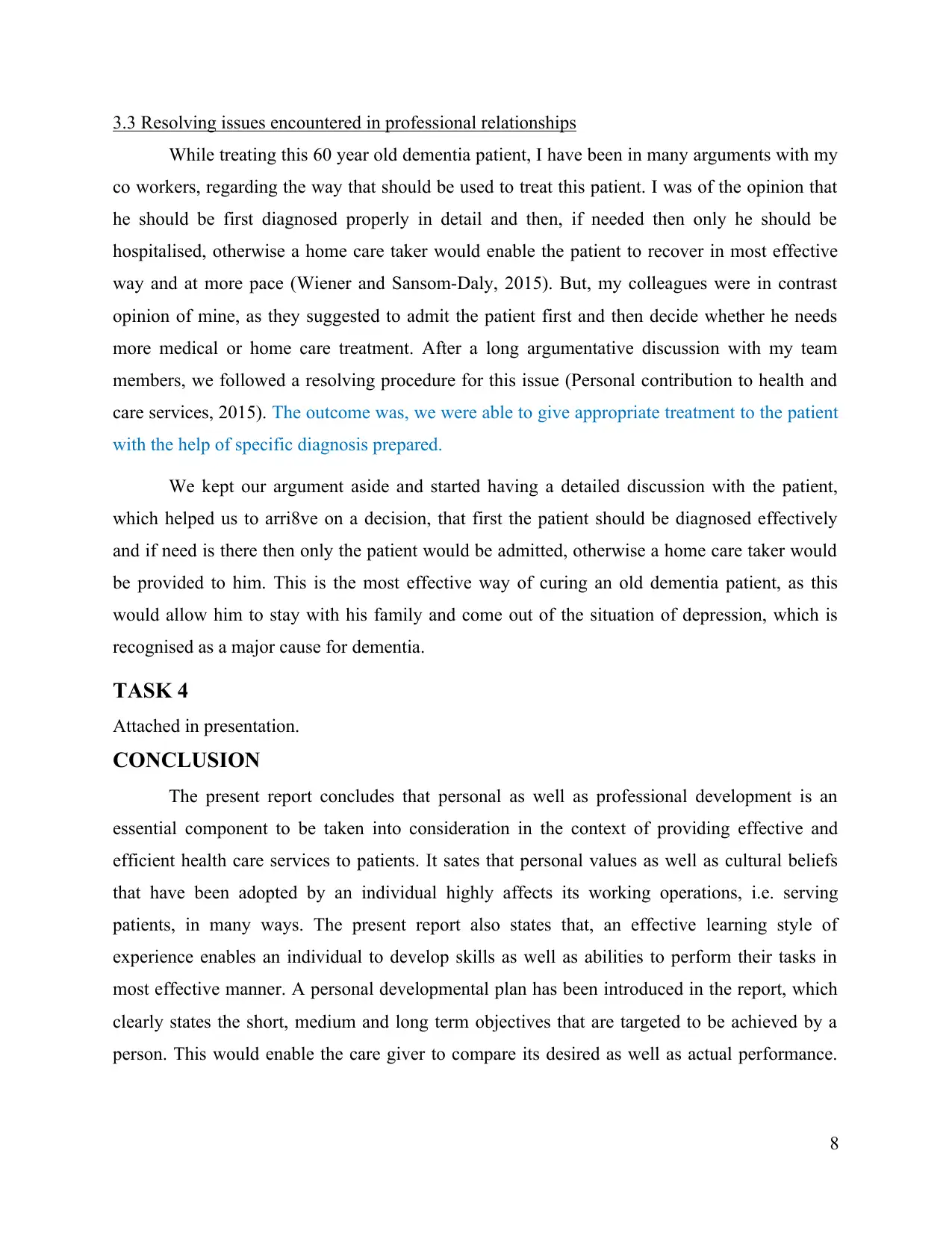
3.3 Resolving issues encountered in professional relationships
While treating this 60 year old dementia patient, I have been in many arguments with my
co workers, regarding the way that should be used to treat this patient. I was of the opinion that
he should be first diagnosed properly in detail and then, if needed then only he should be
hospitalised, otherwise a home care taker would enable the patient to recover in most effective
way and at more pace (Wiener and Sansom-Daly, 2015). But, my colleagues were in contrast
opinion of mine, as they suggested to admit the patient first and then decide whether he needs
more medical or home care treatment. After a long argumentative discussion with my team
members, we followed a resolving procedure for this issue (Personal contribution to health and
care services, 2015). The outcome was, we were able to give appropriate treatment to the patient
with the help of specific diagnosis prepared.
We kept our argument aside and started having a detailed discussion with the patient,
which helped us to arri8ve on a decision, that first the patient should be diagnosed effectively
and if need is there then only the patient would be admitted, otherwise a home care taker would
be provided to him. This is the most effective way of curing an old dementia patient, as this
would allow him to stay with his family and come out of the situation of depression, which is
recognised as a major cause for dementia.
TASK 4
Attached in presentation.
CONCLUSION
The present report concludes that personal as well as professional development is an
essential component to be taken into consideration in the context of providing effective and
efficient health care services to patients. It sates that personal values as well as cultural beliefs
that have been adopted by an individual highly affects its working operations, i.e. serving
patients, in many ways. The present report also states that, an effective learning style of
experience enables an individual to develop skills as well as abilities to perform their tasks in
most effective manner. A personal developmental plan has been introduced in the report, which
clearly states the short, medium and long term objectives that are targeted to be achieved by a
person. This would enable the care giver to compare its desired as well as actual performance.
8
While treating this 60 year old dementia patient, I have been in many arguments with my
co workers, regarding the way that should be used to treat this patient. I was of the opinion that
he should be first diagnosed properly in detail and then, if needed then only he should be
hospitalised, otherwise a home care taker would enable the patient to recover in most effective
way and at more pace (Wiener and Sansom-Daly, 2015). But, my colleagues were in contrast
opinion of mine, as they suggested to admit the patient first and then decide whether he needs
more medical or home care treatment. After a long argumentative discussion with my team
members, we followed a resolving procedure for this issue (Personal contribution to health and
care services, 2015). The outcome was, we were able to give appropriate treatment to the patient
with the help of specific diagnosis prepared.
We kept our argument aside and started having a detailed discussion with the patient,
which helped us to arri8ve on a decision, that first the patient should be diagnosed effectively
and if need is there then only the patient would be admitted, otherwise a home care taker would
be provided to him. This is the most effective way of curing an old dementia patient, as this
would allow him to stay with his family and come out of the situation of depression, which is
recognised as a major cause for dementia.
TASK 4
Attached in presentation.
CONCLUSION
The present report concludes that personal as well as professional development is an
essential component to be taken into consideration in the context of providing effective and
efficient health care services to patients. It sates that personal values as well as cultural beliefs
that have been adopted by an individual highly affects its working operations, i.e. serving
patients, in many ways. The present report also states that, an effective learning style of
experience enables an individual to develop skills as well as abilities to perform their tasks in
most effective manner. A personal developmental plan has been introduced in the report, which
clearly states the short, medium and long term objectives that are targeted to be achieved by a
person. This would enable the care giver to compare its desired as well as actual performance.
8
Paraphrase This Document
Need a fresh take? Get an instant paraphrase of this document with our AI Paraphraser
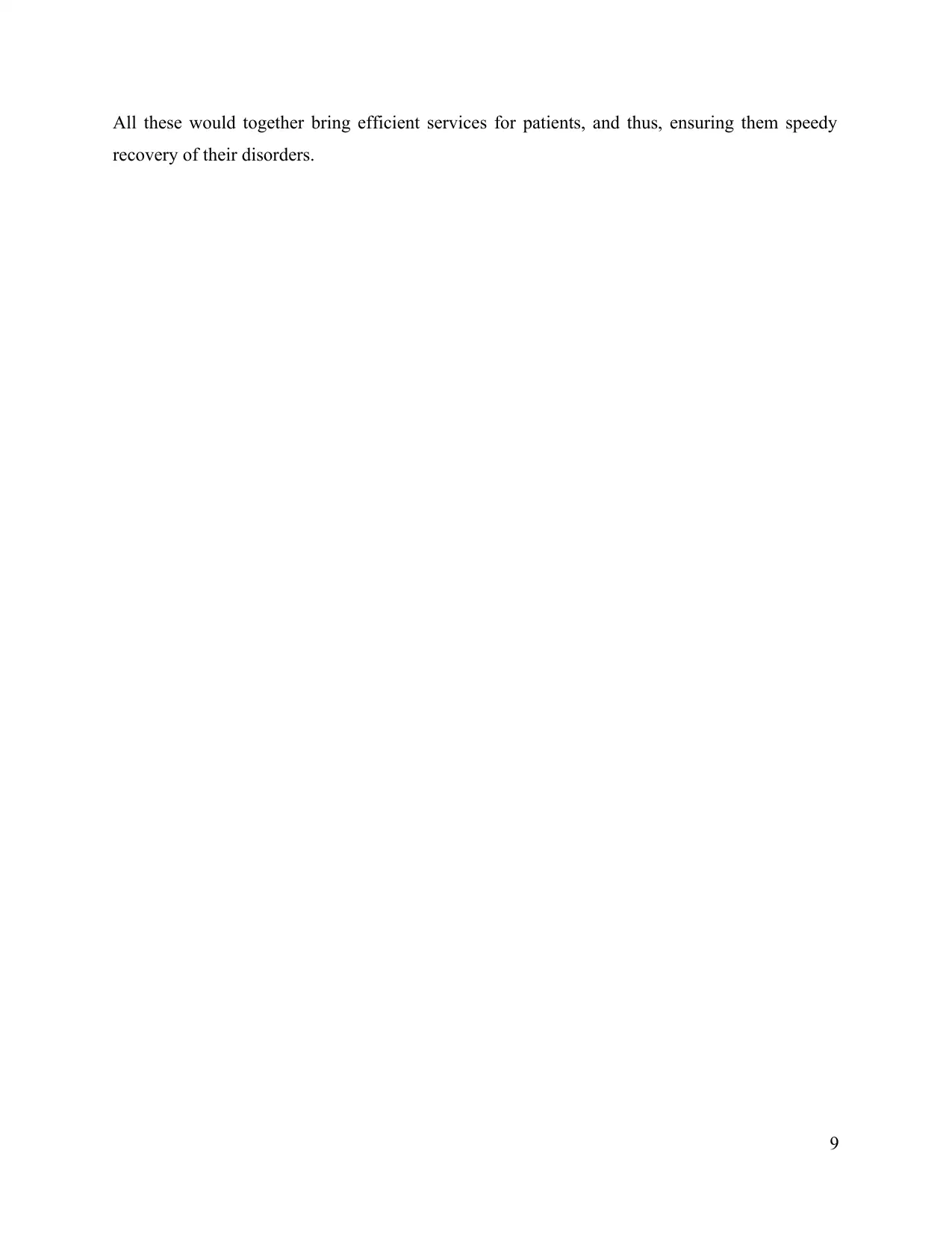
All these would together bring efficient services for patients, and thus, ensuring them speedy
recovery of their disorders.
9
recovery of their disorders.
9
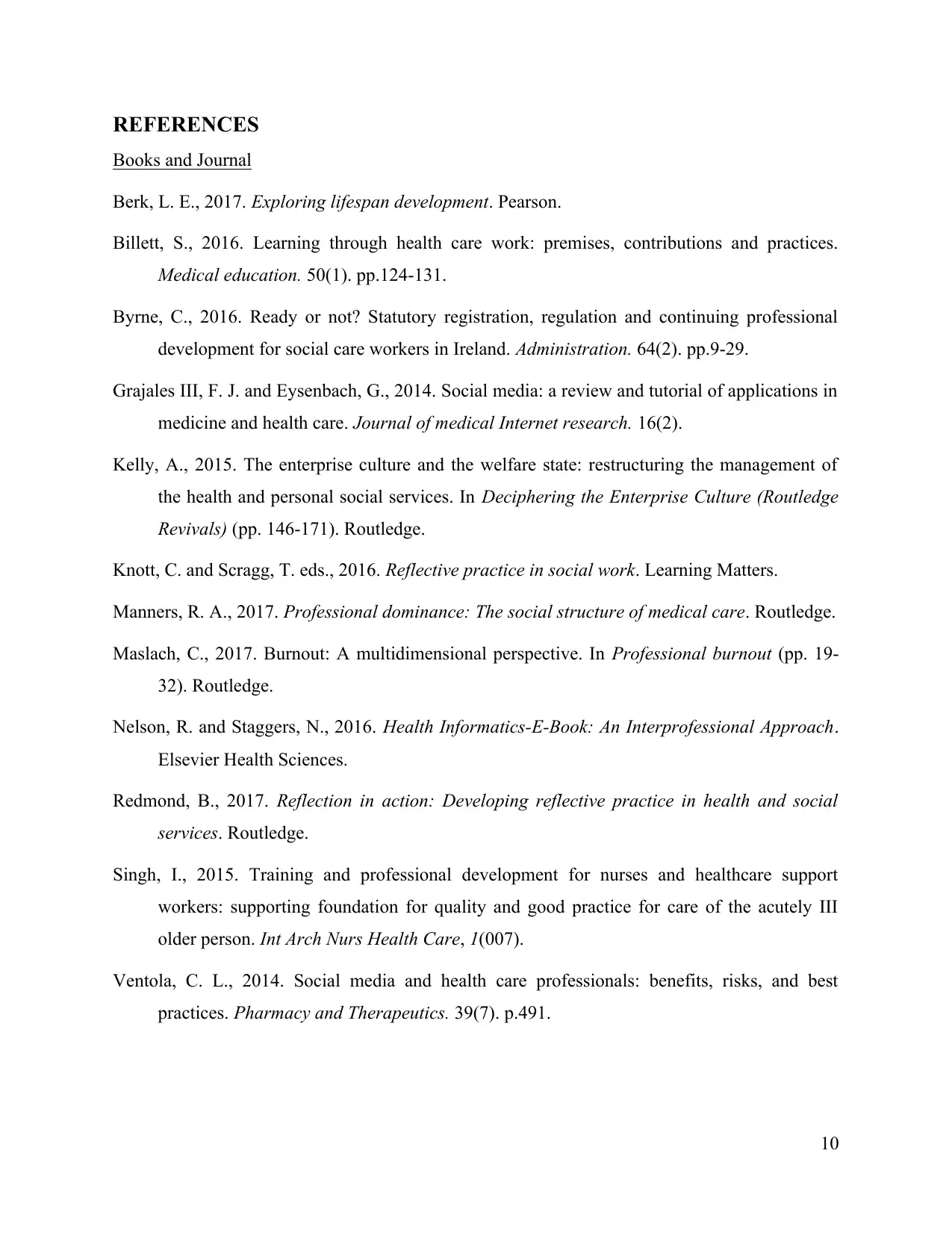
REFERENCES
Books and Journal
Berk, L. E., 2017. Exploring lifespan development. Pearson.
Billett, S., 2016. Learning through health care work: premises, contributions and practices.
Medical education. 50(1). pp.124-131.
Byrne, C., 2016. Ready or not? Statutory registration, regulation and continuing professional
development for social care workers in Ireland. Administration. 64(2). pp.9-29.
Grajales III, F. J. and Eysenbach, G., 2014. Social media: a review and tutorial of applications in
medicine and health care. Journal of medical Internet research. 16(2).
Kelly, A., 2015. The enterprise culture and the welfare state: restructuring the management of
the health and personal social services. In Deciphering the Enterprise Culture (Routledge
Revivals) (pp. 146-171). Routledge.
Knott, C. and Scragg, T. eds., 2016. Reflective practice in social work. Learning Matters.
Manners, R. A., 2017. Professional dominance: The social structure of medical care. Routledge.
Maslach, C., 2017. Burnout: A multidimensional perspective. In Professional burnout (pp. 19-
32). Routledge.
Nelson, R. and Staggers, N., 2016. Health Informatics-E-Book: An Interprofessional Approach.
Elsevier Health Sciences.
Redmond, B., 2017. Reflection in action: Developing reflective practice in health and social
services. Routledge.
Singh, I., 2015. Training and professional development for nurses and healthcare support
workers: supporting foundation for quality and good practice for care of the acutely III
older person. Int Arch Nurs Health Care, 1(007).
Ventola, C. L., 2014. Social media and health care professionals: benefits, risks, and best
practices. Pharmacy and Therapeutics. 39(7). p.491.
10
Books and Journal
Berk, L. E., 2017. Exploring lifespan development. Pearson.
Billett, S., 2016. Learning through health care work: premises, contributions and practices.
Medical education. 50(1). pp.124-131.
Byrne, C., 2016. Ready or not? Statutory registration, regulation and continuing professional
development for social care workers in Ireland. Administration. 64(2). pp.9-29.
Grajales III, F. J. and Eysenbach, G., 2014. Social media: a review and tutorial of applications in
medicine and health care. Journal of medical Internet research. 16(2).
Kelly, A., 2015. The enterprise culture and the welfare state: restructuring the management of
the health and personal social services. In Deciphering the Enterprise Culture (Routledge
Revivals) (pp. 146-171). Routledge.
Knott, C. and Scragg, T. eds., 2016. Reflective practice in social work. Learning Matters.
Manners, R. A., 2017. Professional dominance: The social structure of medical care. Routledge.
Maslach, C., 2017. Burnout: A multidimensional perspective. In Professional burnout (pp. 19-
32). Routledge.
Nelson, R. and Staggers, N., 2016. Health Informatics-E-Book: An Interprofessional Approach.
Elsevier Health Sciences.
Redmond, B., 2017. Reflection in action: Developing reflective practice in health and social
services. Routledge.
Singh, I., 2015. Training and professional development for nurses and healthcare support
workers: supporting foundation for quality and good practice for care of the acutely III
older person. Int Arch Nurs Health Care, 1(007).
Ventola, C. L., 2014. Social media and health care professionals: benefits, risks, and best
practices. Pharmacy and Therapeutics. 39(7). p.491.
10
⊘ This is a preview!⊘
Do you want full access?
Subscribe today to unlock all pages.

Trusted by 1+ million students worldwide
1 out of 13
Related Documents
Your All-in-One AI-Powered Toolkit for Academic Success.
+13062052269
info@desklib.com
Available 24*7 on WhatsApp / Email
![[object Object]](/_next/static/media/star-bottom.7253800d.svg)
Unlock your academic potential
Copyright © 2020–2026 A2Z Services. All Rights Reserved. Developed and managed by ZUCOL.





